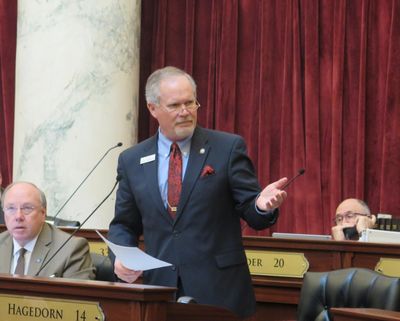Idaho Senate kills $10 million plan to pay for care for those who can’t afford insurance

BOISE – A proposal to spend $10 million next year to provide health care to 15,000 of the most chronically ill members of Idaho’s health coverage gap population failed in the Idaho Senate on Monday after nearly two hours of debate.
The bill, proposed by Sen. Marv Hagedorn, R-Meridian, who co-chaired an interim legislative working group that examined options for the state’s gap population, failed on a 13-22 vote. Those in the gap are the estimated 78,000 Idahoans who earn too much to qualify for Idaho’s limited Medicaid program, but not enough to qualify for subsidized insurance through the state’s health insurance exchange.
Hagedorn noted that among the working group’s recommendations were that the 2017 Legislature take action to provide some kind of health care to some portion of that gap group. It also recommended that if Idaho accepted federal Medicaid expansion funds, it enact a conditional “sunset” expiration clause in case federal policies change. “This is not that,” Hagedorn said.
Instead, he said, the bill would tap $10 million in tobacco settlement funds to cover about 15,000 of the most chronically ill among the gap population with coordinated primary care and also would steer people who come to emergency rooms inappropriately into coordinated care programs.
“We are all paying for these costs today,” Hagedorn said. “Nothing is free.”
Hagedorn said the program would provide care, not insurance. If they get cancer or need surgery, he said, they’d be thrown back on the state’s existing catastrophic health care program, which is funded by local property taxpayers and the state general fund.
“This sets up a foundation of coordinated care for the chronically ill gap population,” he said.
Sen. Maryanne Jordan, D-Boise, said she wanted to acknowledge Hagedorn’s work on the issue, “because it’s unbelievably important to Idaho.”
But she said the types of efforts envisioned in the bill already are underway in Idaho through community health centers. And she said tapping the Millennium Fund endowment earnings, which come from tobacco settlement funds, “will strip away funding” for existing programs that use that funding, including the Project Filter anti-tobacco program and the Idaho Suicide Hotline.
“I think we have a long way to go in this issue, and many more robust debates to have in the future, but, sadly, I don’t think this gets us there,” Jordan said.
Sen. Mary Souza, R-Coeur d’Alene, urged support for the bill.
“I believe that our health care system in the United States is upside down,” she said. “We focus on illness, illness pays very well, and there’s a big revenue stream. … If we are going to improve our lifestyle here in Idaho, we are going to have to flip that model upside down.”
Souza urged senators, “Improve the level of people’s wellness, rather than just feeding the illness machine.”
She said the bill would start the process of “innovations” that Idaho’s health care system needs.
Sen. Jim Patrick, R-Twin Falls, said he didn’t want to take funding away from other Millennium Fund programs.
“I have a hard time supporting this legislation. For one thing, $10 million is a drop in the bucket – it’s going to take $100 million,” he said.
Hagedorn, in his closing debate, said, “These aren’t deadbeats. These are people who have jobs. … And they have health problems.
“We need to encourage these patients, these participants, to get healthy,” he said. “At the same time we need to bend the cost curve. … This is not a cure-all, totally granted, not a cure-all. But this sets the foundation for people to get healthy. There are people dying right now, people dying today, because they don’t have health care. So weigh this: Where’s it better to spend our Millennium money? … To help chronically ill people that don’t have insurance get well – that’s the focus of this, nothing more.”
With the defeat of Hagedorn’s bill, there’s still one more proposal pending in the House, which also seeks to tap tobacco settlement funds to pay for some primary care for a portion of the gap population; that bill hasn’t yet had a committee hearing.